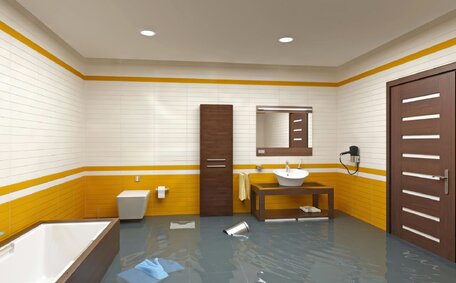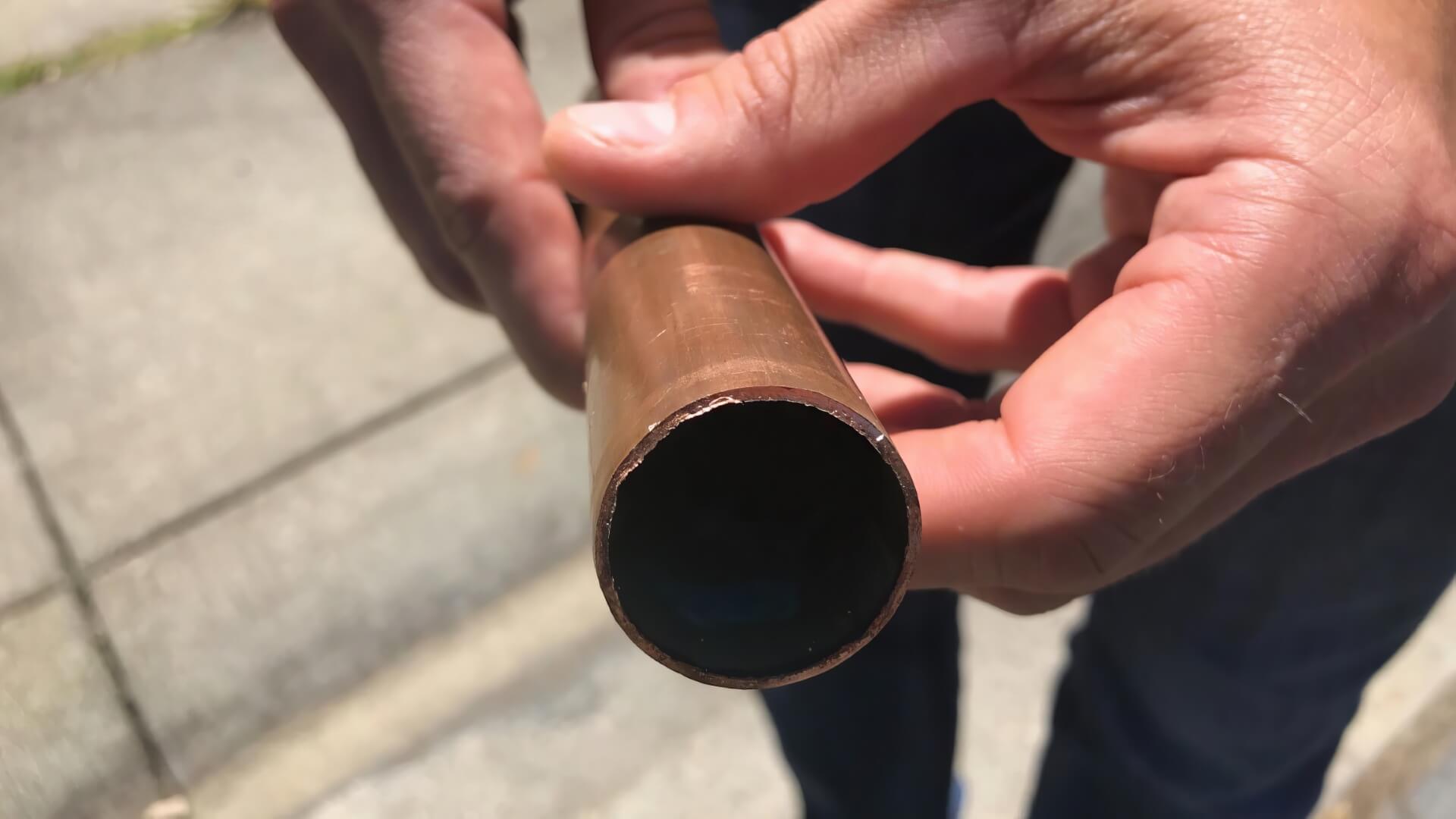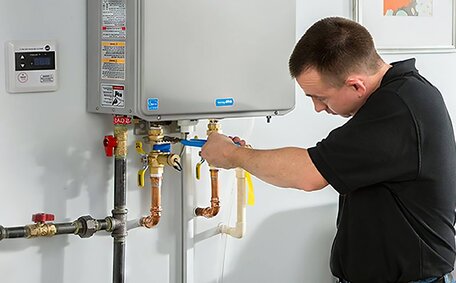
Signs Your Hot Water System Is Failing
Common signs your hot water system is failing include strange noises, rust, leaks, inconsistent temperature and pressure. Call our licensed plumbers if you notice these issues for repairs.
Read MoreAs pipes can age and deteriorate over time, they become susceptible to cracks, breaks, and leaks. Materials like cast iron and galvanised steel corrode, while pipes made of PVC, copper, and CPVC can become brittle and develop joints that fail. Factors like ground shifting, tree root invasion, excessive water pressure, and chemical exposure can also damage pipes.
When pipes begin to leak or break, there are significant health and safety consequences. Toxic moulds and bacteria may also grow, releasing spores into living areas. Toxic moulds and bacteria may also grow, releasing spores into living areas.
Contaminants can infiltrate drinking water lines, leading to illness. Contaminants can infiltrate drinking water lines, leading to illness.
When you opt for pipe relining, it can be an essential measure in ensuring your drinking water remains untainted by leaking or corroded pipes, seamlessly integrating into your infrastructure and mitigating significant health risks. coli and chemicals like lead, copper, and pesticides can infiltrate water lines. Consuming this toxic water, even in small amounts over time, can cause gastrointestinal illness, reproductive problems, neurological disorders, kidney and liver damage, and even cancer.
Harmful bacteria like E.
According to studies, durable epoxy pipe liners can prevent leaks and contamination infiltration for decades. You should opt pipe relining, which can ensure clean, safe drinking water by creating a protective barrier inside your damaged pipes. Pipe relining gets the job done more efficiently than traditional pipe repairs, and even more so than pipe relining in other contexts, reducing the chance of illness from contaminated drinking water compared to allowing damaged pipework to continue leaking.
Over time, most pipe materials like cast iron, galvanised steel, copper, and PVC corrode from exposure, often becoming the cause of a damaged pipe. This corrosion compromises the integrity of your plumbing system, making it far more vulnerable to cracking, breaking, and leaking hazardous substances.
As corrosion creates new pipe vulnerabilities in your pipe walls, water can escape into pipes into the neighbouring soil and wider environment. Harmful bacteria, viruses, gases like radon, and chemical contaminants can also exploit these vulnerabilities to infiltrate your sewer pipes and drinking water lines. Tree roots are similarly drawn to the moisture and nutrients around a broken pipe.
As corrosion advances and pipe walls weaken further, the risks of major pipe failures rise significantly too.
Sudden bursts lead to flooding, necessitating immediate pipe repair, water damage, and mould growth. The dangers only compound if hazardous gases or contaminated fluids spread unchecked. By relining ageing pipes, epoxy barriers prevent corrosion leaks for decades.
When it comes to replacing your traditional repair strategies with more advanced solutions, pipe relining should be considered for preventing enduring leaks and significant property damage. Flooding from burst pipes or pinhole leaks can damage your building foundations, warps hardwood floors, breeds toxic mould, and ruins insulation, walls, and contents. The structural integrity of a home can be compromised too.
Leaking pipes also widen the gap between the relining pipe replacement option and the destructive traditional methods, with the former protecting soil from contamination. Tree roots aggressively infiltrate broken pipes and drains as well, clogging networks and causing backflows of raw sewage - resulting in extremely hazardous conditions requiring urgent professional help.
One should consider pipe relining, a robust solution your pipes need, serving as an effective preventative measure; relining pipe through pipe lining creates a protective epoxy barrier that stops leaks in their tracks. When considering pipe relining vs traditional replacement, relining can rejuvenate your existing pipe internally with a non-invasive technique and minimal property disruption.
With the technology we use, including CCTV and specialised equipment, the pipe relining process fortifies your existing sewer and stormwater lines in just a few hours, avoiding the need for destructive excavation or re-landscaping.
Damage Pipe relining offers a tailored solution for your pipe system that essentially creates a new pipe within your existing infrastructure, improving the function and longevity of your drains and providing a cost-effective way of repairing and preventing your damaged infrastructure problems. The process effectively creates a new pipe inside old pipe, involving the insertion of a durable epoxy resin lining into the damaged ones.
Unlike traditional pipe replacement methods that cause extensive digging and disruption your daily life, your relined pipes are carried out with minimal disruption to your routine through a seamless process utilising trenchless technology, completed in just a few hours. Drain relining reinforces the structures within your drain without the need to destroy your home or yard.
The custom-fitted epoxy barrier is stronger than traditional materials, crafted to safeguard your old pipe against decades of corrosion, root intrusion, ground shifting, high water pressure and other common causes of damage. The smooth inner lining facilitates improved water flow too.
By proactively engaging in sewer pipe relining, property owners can address blocked drains before they escalate, thereby saving thousands in potential emergency plumbing bills down the track. Pipe relining helps avoid catastrophic pipe failures, leakage contamination risks and unchecked flooding leading to mould risks and foundational damage.
Our plumbers adeptly employ state-of-the-art CCTV pipe inspection equipment to assess all your pipes first, custom-fitting durable epoxy liners to provide long-term insulation and stability, including on the north shore. Check out our service offerings and get your tailored advice on suitability for your home or business by contacting us today; all inquiries will be promptly addressed.
Among the benefits pipe relining provides is long-lasting durability and an effective prevention against future leaks. The seamless epoxy resin barriers used in the relining process are designed to withstand decades of wear and tear.
Opting for pipe relining means using epoxy liners that, unlike PVC or galvanised steel, do not weaken, corrode over time, or develop leaks. Studies have determined how long does pipe relining last, showing these resilient pipe liners can endure over 50 years without needing repairs or replacement.
The custom-fitted liners also provide a smooth surface, protective layer inside pipes without compromising the existing structure, facilitating improved water flow and resistance to buildups. Using pipe relining for sewer issues can help any homeowner avoid emergency blockages, backflows, flooding damage and other hazardous plumbing failures.
While the initial cost of pipe relining can costly surpass that of short-term fixes, it ultimately saves money by precluding costly replacements. With trenchless pipe relining, your pipes and property stay intact too.
For mending a damaged plumbing pipe, you have options like pipe relining which reinforces the interior without dig and full replacement which involves excavation. Relining pipes involves coating the interior of a drain pipe with an epoxy resin, establishing a durable, leak-proof barrier. With the damage control pipe relining offers, you won’t need excavation or removal of old pipes to install new piping.
There’s no comparison to pipe relining, which takes just hours to complete without digging up your property, unlike pipe replacement that can take days and leave yards torn up. Pipe relining also costs far less on average than full replacement, eliminating the need worry about undue financial burdens. The resin liners used are designed to last 50+ years too, so there’s less to worry about compared to pipes like PVC that deteriorate faster.
However, those who opt pipe replacement gain the opportunity to fully reconfigure pipe layouts or upgrade materials. Relining, which can used be adapted to most situations, also has limitations based on pipe damage and accessibility. For severe corrosion, cracks or collapsed pipes, we would advise that replacement may be the only viable option.
Overall, Pipe relining is far less invasive, more cost effective, and longer-lasting than pipe replacement in most situations. Our team can assess your pipes and advise on the best pipe relining products to reline your property’s plumbing where needed, ensuring the best overall solution. Our services do include hydro jetting and drain cleaning to complement pipe relining when suitable.
When selecting a professional pipe relining company, it pays to do your homework. Look for an experienced service with a proven track record, extensive industry credentials and positive customer reviews. Opting for pipe relining means choosing a provider that offers extensive warranties on high quality epoxy products, advanced CCTV pipe inspection equipment, and non-intrusive trenchless processes.
As Sydney’s leading pipe relining Sydney specialists since 2005, Marrickville Plumbing ticks all the boxes. Our fully certified and insured team has provided relining Sydney services for over 5,000 properties with durable epoxy barriers guaranteed to outlast traditional piping. We also provide complimentary consultations, quote assessments and the highest safety standards.
Whether you need to proactively reline ageing pipes or repair your plumbing issues like damaged drains, you can count on our end-to-end services, zero harm values and unrivalled expertise. Call us 1300 for all your plumbing needs, schedule a CCTV pipe inspection, or discuss the most suitable pipe relining options for your home or business.
What specific licencing and certifications does your company have? Proper credentials like plumbing and drainlaying licences ensure technicians are properly qualified to handle pipe relining projects.
How long have you offered pipe relining services? Look for an established company with extensive experience successfully reinforcing thousands of properties over many years.
Can you take me through the full pipe relining process from inspection to completion? Understanding the stages of relining and methods used ensures transparency.
Do you perform CCTV pipe inspections before and after relining? In-depth CCTV assessments are crucial for identifying problem areas and custom-fitting epoxy liners.
What specific epoxy resins do you use? Quality corrosion-resistant epoxy certified for gas and potable water applications are vital for safety and longevity.
What warranty do you provide on pipe relining? Reputable providers offer 50+ year warranties on epoxy materials and several years on workmanship.
How long will the project take and how much disruption or restoration is needed after? Optimal your pipe relining is a seamless, non-invasive process with minimal impacts.
May I please see testimonials from past pipe relining clients? Customer reviews validate quality of service and work delivered.
Common signs your hot water system is failing include strange noises, rust, leaks, inconsistent temperature and pressure. Call our licensed plumbers if you notice these issues for repairs.
Read MorePipe relining is an eco-friendly alternative to pipe replacement that uses materials like epoxy resin to repair pipes without digging. It produces less waste and emissions than traditional methods. Learn about the environmental benefits of trenchless pipe relining.
Read MoreReplacing an outdated electric, gas or solar hot water system with a more efficient heat pump or solar model can significantly reduce your energy bills and carbon footprint. Take advantage of available rebates. Contact us to retrofit your old system today.
Read MoreMarrickville, 2204 NSW
We will call back as soon as possible.




